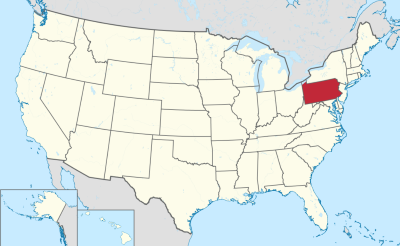Here you’ll find the largest list with Pennsylvania hosting reviews. We’ve listed all Pennsylvania web hosting providers with our UNCENSORED review and that of users.

Quick Facts
Internet Speed: 15.5 Mbps; 5.3 Mbps
Population: 12.8 million
Internet Coverage: 85% of residents
Main Internet Services: Cable, DSL, Fiber
Main Internet Service Providers: Comcast, Verizon, FIOS by Verizon
Colocation Datacenters: 46
Internet in Pennsylvania
According to Akamai.com, the average downlink Internet speed in Pennsylvania is 15.5 Mbps and the average uplink speed is 5.3 Mbps.
In 2016, the population of Pennsylvania was approximately 12.8 million. Over 85% of residents have access to the Internet, especially broadband connections.
Main Internet services provided in Pennsylvania are as follows:
– Cable – over 90% coverage
– DSL – over 85% coverage
– Fiber – over 40% coverage
Main Internet Service Providers located in Pennsylvania are the following:
– Comcast (Cable) – over 90% availability
– Verizon (DSL) – over 85% availability
– FIOS by Verizon (Fiber) – less than 50% availability
Gigabit Internet in Pennsylvania
Gigabit Internet services are scarcely available in Pennsylvania, with less than 10% of the population having access to 1 gigabit broadband. In 2015, RCN, one of the largest regional ISPs in Pennsylvania, announced that they would roll out gigabit Internet to select areas in Philadelphia, with further plans to expand in other cities. Similar initiatives have been put forth or implied by other ISPs, such as Verizon and Comcast, but no concrete have been released as of yet.
Colocation Datacenters in Pennsylvania
According to datacentermap.com, there are currently 46 colocation datacenters located in Pennsylvania. Most datacenters are concentrated in Philadelphia (22), closely followed by Pittsburgh (16), while the rest are distributed across smaller cities, such as Allentown, Ebensburg, and Valley Forge.
In Philadelphia, some of the largest colocation providers are:
– ViaWest, Inc.
– vXchnge
– Digital Realty
– Level 3 Communications
– Quonix Networks, Inc.
– SunGard
In Pittsburgh, some of the largest colocation providers are:
– vXchnge
– Management Science Associates
– Iron Mountain
– Bare Metal Pittsburgh
Prominent Colocation Providers
One of the largest colocation providers located in Pennsylvania is Level 3 Communications, whose main datacenters are located in Philadelphia and Pittsburgh respectively.
In Philadelphia, the largest datacenter operated by this company is located in the downtown area. The 54,000-square-foot facility is a premier and sought-after choice for customers looking for secure, reliable, and flexible colocation solutions. The datacenter provides wholesale and retail colocation services, in addition to disaster recovery and business continuity solutions.
Amenities include: redundant UPS power equipment, primary and backup diesel generators, N+1 HVAC configuration, diverse fiber entry points into the facility. Carrier neutrality is ensured by means of interconnectivity with multiple telecommunications providers and other carrier hotels.
Colocation Industry in Pennsylvania
Pennsylvania is regarded as an emerging colocation market in the United States. Current trends indicate substantial growth in comparison with preceding years. Million-dollar colocation providers keep building state-of-the-art facilities to establish a strong presence on the East Coast, without actually having to build in New York, where vacancy rates have reached all-time lows. Pennsylvania – most notably Philadelphia – has distinguished itself as a reliable and rather affordable disaster recovery market. In spite of the considerably higher costs for operating datacenters in New York and therefore co-locating in the region, it is quite likely that most customers will be more attracted to the offering of this market rather than Pennsylvania’s, due to greater advantages offered by the former.
Advantages for Colocation
There are many advantages for colocation relative to other markets, and are as follows:
– strong economy centered around healthcare, financial services, and manufacturing, which drive most demand for colocation services
– extensive privately-owned fiber network (esp. in Philadelphia)
– relatively low risk for natural disasters
Disadvantages for Colocation
Disadvantages for colocation include the following:
– no colocation-friendly legislation to incentivize more investments
– relatively high costs for electricity and overall maintenance, but not higher than New York and New Jersey’s ($0.09 vs. $0.14 per kWh)



